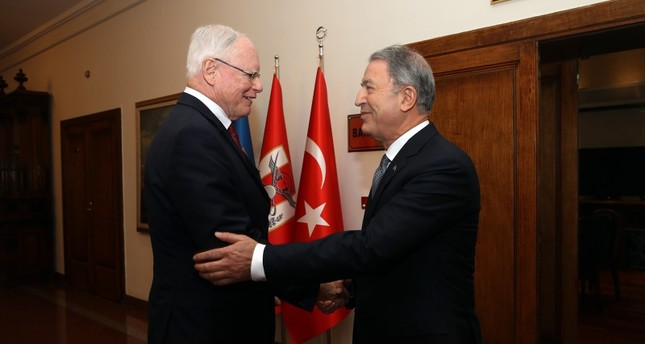US envoy to Syria James Jeffrey with Turkish Defense Minister Hulusi Akar (File)
Averting a possible conflict over Turkish cross-border military operations, the US and Turkey have reached agreement on joint oversight of a “safe zone” in northeast Syria.
After three days of talks in Ankara, the two countries agreed on a joint operations room to establish and manage the zone across 400 km (250 miles) of the Turkish-Syrian border, including between the Euphrates River and the Iraq frontier.
Turkish President Recep Tayyip Erdoğan has repeatedly said Turkish military units would move into a zone which is 40 km (25 miles) deep across the Kurdish cantons of Kobani and Cezire. He demanded the withdrawal of the Kurdish militia YPG, the leading element in the US-supported Syrian Democratic Forces who have removed the Islamic State from northeast Syria.
The Erdoğan Government considers the YPG “terrorists” who are part of the Turkish Kurdish insurgency PKK. On Sunday, the President declared, “Now we are going to enter east of the Euphrates. We have shared this with Russia and the United States.We can only be patient for so long.”
US Defense Secretary Mark Esper drew the American line on Tuesday, “What we’re going to do is prevent unilateral incursions that would upset, again, these mutual interests…the United States, Turkey and the SDF share with regard to northern Syria.”
That brought Erdoğan’s response: “We will move the process…to a different phase very soon.”
See EA on Radio FM4: Will Turkey’s Military Move Into Northeast Syria?
Syria Daily, August 7: US — We Will Block Turkey’s Military Operations Across Border
However, the talks between Turkish officials and the US envoy to Syria, James Jeffrey, continued. On Wednesday, Erdoğan said that the discussion had progressed in a “really positive” direction.
What really mattered here was the issue of this step being taken on the east of the Euphrates, and this is now being realized together with the Americans….[We agreed on the] rapid implementation of initial measures to address Turkey’s security concerns.
Lack of Detail
But yesterday’s announcement did not address the key points which had divided Turkey and the US.
While Ankara sought a 40-km (25-mile) deep zone, later revising this to 30 km (19 miles), the US would only offer
a 5-km (3-mile) demilitarized strip and an additional 9 km (5.6 miles) cleared of heavy weapons.
Kurdish officials have said that they will accept the YPG’s withdrawal from the 5-km strip.
Turkey stepped back from its demand for its force to patrol the zone on their own; however, it is still seeking ultimate authority.
Defense Secretary Hulusi Akar avoided any points of difference, “We said we wanted to act together with our friend and ally, the United States.”


Is Turkey burying Syria’s revolution by using Syrian rebels against YPG?
https://www.jpost.com/Middle-East/Is-Turkey-burying-Syrias-revolution-by-using-Syrian-rebels-against-YPG-598324 8/11/2019
–
Turkey, Russia signed secret deal on Idlib that allowed military offensive against Kurds
https://www.nordicmonitor.com/2019/08/turkey-russia-signed-a-secret-deal-on-idlib-military-offensive-against-kurds/ 8/8/2019
–
#SRO, years ago, was first to call #Idlib “giant prison” (search in previous tweets) : a prison for civilians, for opposition, kept by #Assad, #Russia, #Iran and #Turkey soldiers in a small corridor.
https://twitter.com/Syria_Rebel_Obs/status/1160603630342496256 8/11/2019
–
After a tense week of negotiations, the U.S. embassy in Ankara issued a sanguine statement on Wednesday announcing an agreement on “initial measures to address Turkey’s security concerns,” the creation of a joint U.S.-Turkish operations center and efforts towards repatriating Syrian refugees. […] Bassam Ishak, the Syrian Democratic Council’s diplomat in Washington, told the National Interest that the current agreement is ambiguous, but set down the SDF’s red lines for its interpretation. He said that the SDF may accept a “Turkish presence in patrols” but not a “stationary Turkish presence” in any future safe zone, and that “it is not acceptable” for Turkey to move “jihadi” proxies into the area.
https://nationalinterest.org/feature/turkey%E2%80%99s-demands-meet-reality-when-it-comes-syria-72181 8/8/2019